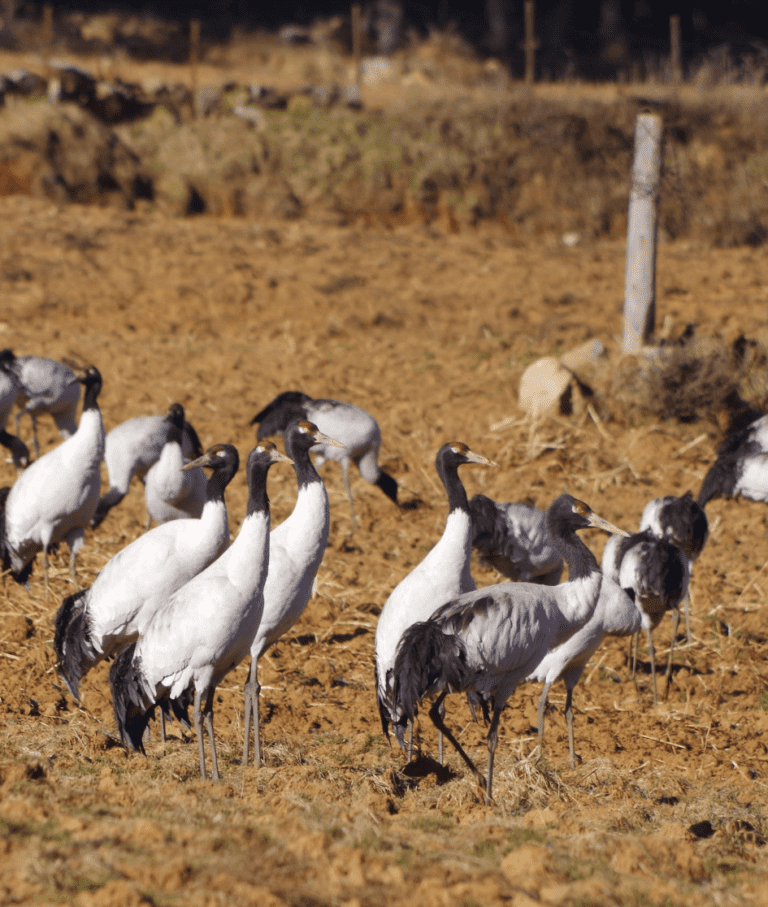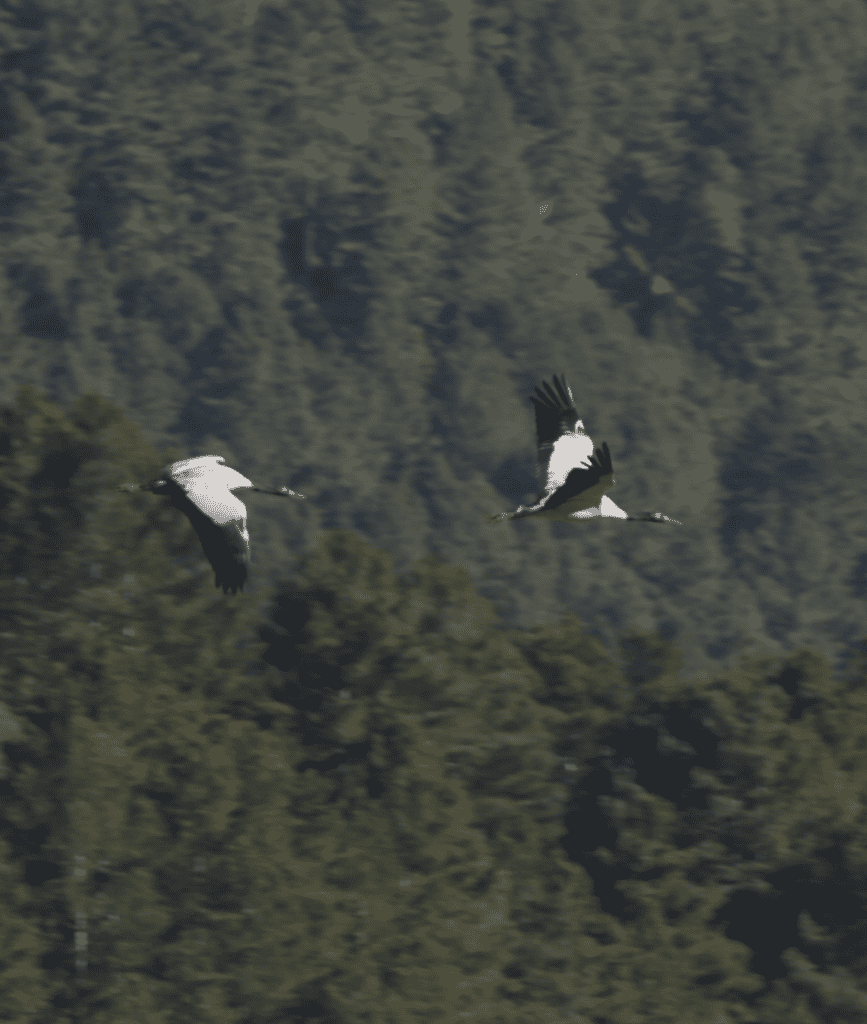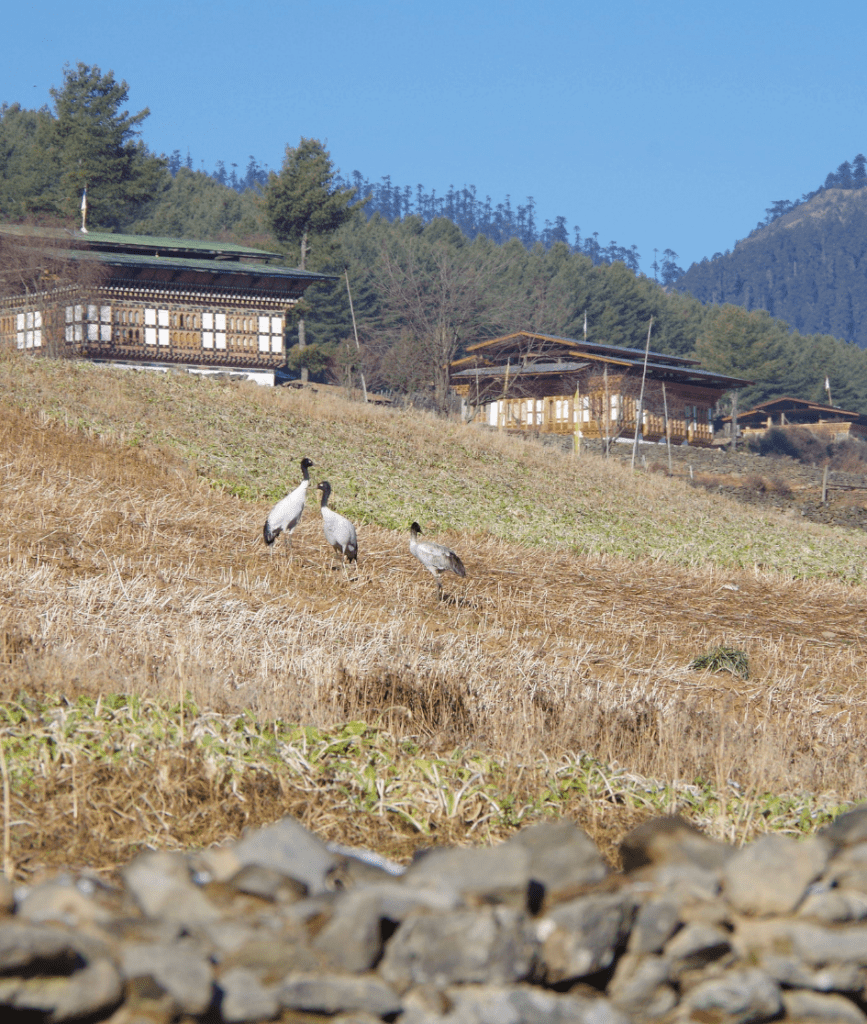At the end of this month, more than 200 countries from across the globe will come together to share their plans to cut emissions by 2030 at the United Nations COP26. They will be called on to make strong commitments to net zero emissions by 2050 and are expected to make pledges to end coal, petrol cars and to protect nature. As the only carbon negative country in the world, Bhutan will be a leader in these discussions and brings much to the international table when it comes to protecting the natural environment.
If Bhutan wears the crown for caring for the environment, then Phobjikha Valley is the jewel in that crown. Phobjikha Valley is one of the largest, high-altitude wetlands in Bhutan, situated on the western slopes of Jigme Singye Wangchuck National Park. Wetlands are one of the most extraordinary ecosystems in the world, due to their ability to store and slowly release water and as such they are a lifeline for biodiversity. However, like many other wetlands, Phobjikha has experienced rapid change in the last few years due to expanding development, social transformation, and modernization. This includes changes to the wetlands – an area crucial for the survival of the stately Black-Necked Crane.
Each winter the people of Phobjikha Valley eagerly await the return of Black-Necked Cranes. These majestic birds migrate from their breeding grounds in the upper Tibetan Plateau to this remote valley in the Himalaya and roost there until spring amid the alpine wetlands. It is believed that the first birds, which tend to arrive in late October, circle the magnificent 17th-century Gangtey Gompa monastery, three times before descending below to the wetlands to settle in for winter. This act is deeply embedded in Bhutanese folklore and is considered a great blessing for the valley, winged with hope, peace and prosperity. For visitors, it is a chance to see an incredibly rare bird up close in a pristine, natural environment where it is loved and treasured.
PHOTO CREDIT: RSPN BHUTAN
Across South Asia, there are as few as 5000 of these graceful birds in the wild and therefore Phobjikha Valley, of which Gangtey is a part, has become an important wintering habitat for this vulnerable species and hundreds of people visit each year to see them. While grazing, agriculture, and hydroelectricity have all taken a toll on their wetland habitat, Bhutan is making significant strides to ensure the cranes continue to return to the valley. This is in line with a strong Buddhist tradition of compassion and the central tenets of Bhutan’s Gross National Happiness policy, that aims to balance economic development with environmental protection.
In fact, the inhabitants of the Phobjikha Valley, monks included, revere the cranes to such a degree that the government, convinced by the advocacy efforts of Bhutan’s Royal Society for the Protection of Nature (RSPN), buried cabling for the electricity underground rather than have cables on poles, to protect the birds. RSPN has also teamed up with the monks of Gangtey Monastery to hold a crane festival each year in the courtyard of the ancient monastery on November 11th. Visitors not only have the chance to observe the cranes in their wintering ground but are treated to traditional cham dances in which performers wearing carved masks representing deities and school students dressed in black-and-white costumes imitate the graceful movements of the cranes.
In 2018, “Karma”, an injured crane came to be cared for by a small number of staff from RSPN at their Black Neck Crane Visitors Centre in Gangtey. Since then, Karma has been tenderly cared for by a small number of staff in a makeshift aviary. Then in February of this year, another injured crane, “Pema” was rescued and joined Karma at the Centre. The cranes appear to love their adopted home which is the only facility to rehabilitate injured Black-Neck Cranes in Bhutan and RSPN are now looking for support to expand the structure into a facility capable of caring properly for these precious birds.
As always, Gangtey Lodge remains rooted in community and is supporting these efforts to care for the Black-Neck Crane and conserve their habitat through a partnership with RSPN. As a founding member of Small Luxury Hotels of the World’s Considerate Collection, a community of actively sustainable luxury hotels going the extra eco-mile and one of Regenerative Travel’s ‘Regenerative Resorts’, the hotel is inspiring action that improves people’s lives, communities and the world at large.
This sublime glacial valley is a very special destination with a strong take on sustainability. Tucked away on the western slopes of the Black Mountains, it is enticing travellers to explore Bhutan’s hidden secrets and for those who take a little extra time to travel there, they are finding it all the more rewarding for doing so. Like the Black-Neck Cranes that travel several hundred kilometres to reach their winter home, Gangtey Lodge invites you to make the journey to this enchanting corner of the country, where you just might find your own wintering home amongst the clouds.
HEADER PHOTO: Ken Spence Photography









